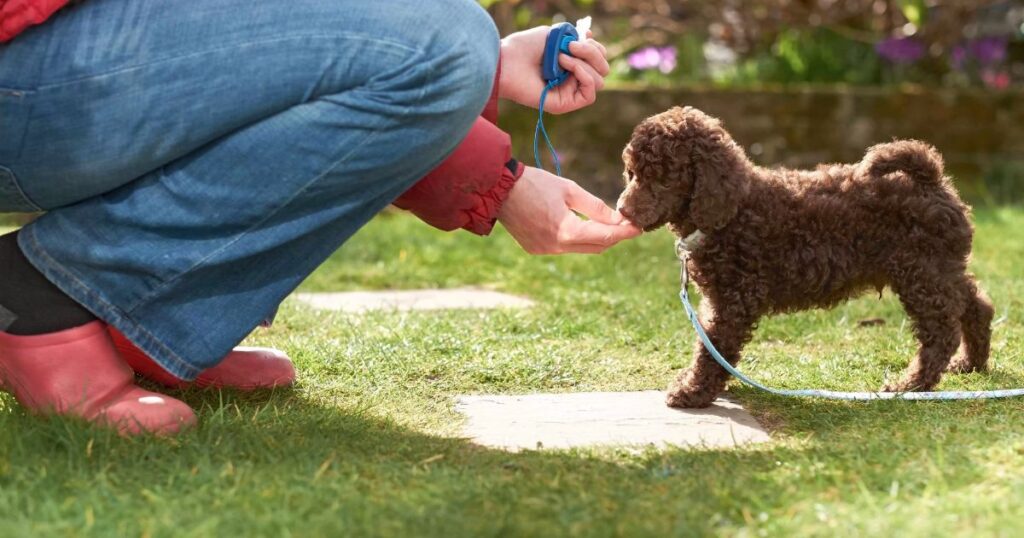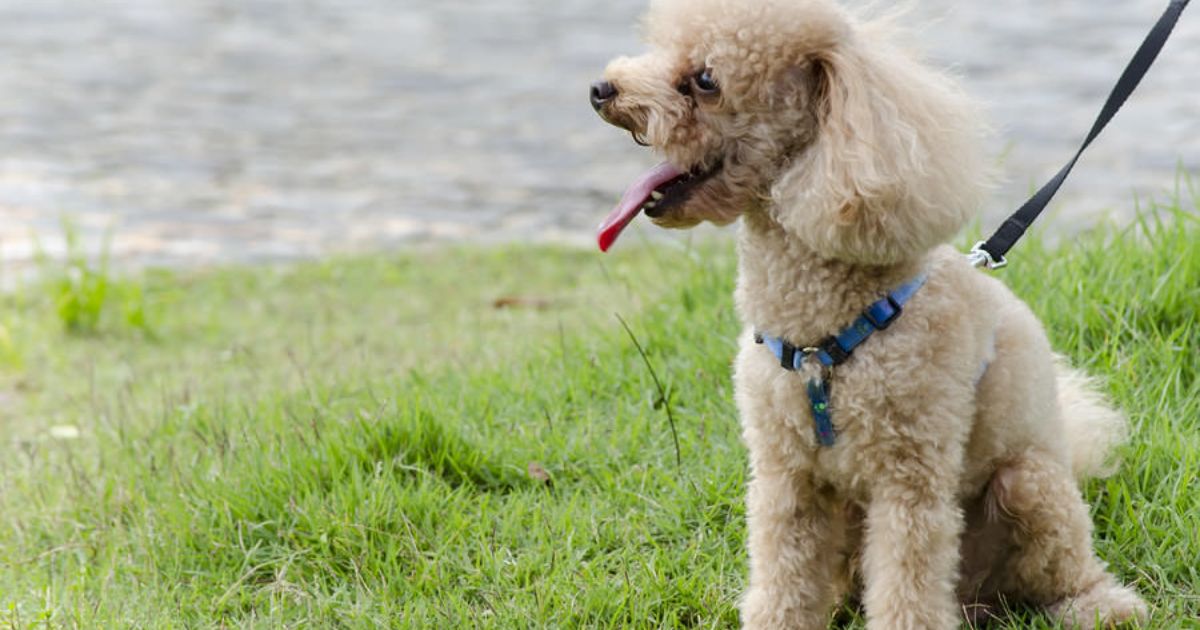Poodles, with their elegant appearance and remarkable intelligence, are one of the most popular dog breeds worldwide. While they excel in various canine activities, from obedience competitions to being loyal family pets, there’s a question that often arises in the minds of potential poodle owners: “Are Poodles Hard to Potty Train?” In this comprehensive guide, we will delve into the intricacies of potty training poodles, offering valuable insights, tips, and strategies to ensure a smooth and successful potty training journey.
Potty training a poodle can be a rewarding and fulfilling experience, but it can also present challenges, especially for first-time dog owners. This article aims to address your concerns, dispel myths, and provide you with the knowledge you need to effectively potty train your poodle. We will cover the following topics:
Understanding Poodle Breeds

Before we dive into the specifics of potty training poodles, it’s crucial to understand the different varieties of poodles and their common traits. This knowledge will help you better comprehend the unique characteristics and challenges associated with each poodle type.
Varieties of Poodles
Poodles come in three primary sizes, each with its own distinct characteristics:
- Standard Poodles: These are the largest poodles, standing over 15 inches at the shoulder. They are known for their elegance and intelligence and make excellent family pets.
- Miniature Poodles: Slightly smaller than standard poodles, miniature poodles are about 10 to 15 inches tall at the shoulder. They share the same intelligence as standard poodles and are equally popular as companions.
- Toy Poodles: The smallest variety, toy poodles, stand under 10 inches tall at the shoulder. They are adorable and highly adaptable to various living situations, making them a favorite choice among city dwellers.
Common Traits
Regardless of the poodle size, poodles share some common traits that can affect their potty training:
- Intelligence: Poodles are renowned for their intelligence and are often ranked among the smartest dog breeds. This intelligence can be both an asset and a challenge in potty training.
- Energetic Nature: Poodles are active dogs, and their boundless energy may lead to restlessness, making it crucial to provide them with sufficient exercise and mental stimulation.
- Hypoallergenic Coat: Poodles have a hypoallergenic coat, which means they shed very little, if at all. This can make accidents more noticeable, as hair does not cover them.
Now that we have a better understanding of poodle varieties and common traits, let’s move on to the basics of potty training.
Poodle Potty Training Basics
Why Is Potty Training Important?
Potty training is a fundamental aspect of raising a well-behaved and happy poodle. Successful potty training, whether you’re working with a poodle or any other breed, ensures that your dog understands where it’s appropriate to relieve itself and helps maintain a clean and sanitary living environment for both your pet and your family. Now, you might be wondering, “Are Golden Retrievers Easy To Potty Train?” Let’s explore this further.
When to Start Potty Training
The ideal time to start potty training your poodle is during puppyhood. Most experts recommend beginning between 12 and 16 weeks of age. At this stage, puppies are more receptive to learning and can adapt to new routines. However, adult poodles can also be potty trained if necessary, but it might require more time and patience.
The Importance of Consistency
Consistency is the cornerstone of successful potty training. Poodles thrive on routines and patterns, so it’s essential to establish consistent rules for potty breaks and praise for desired behavior. Inconsistent training can lead to confusion and delays in the potty training process.
Now, let’s address the central question of this article:
Are Poodles Hard to Potty Train?
Poodles, with their intelligence and unique personality traits, are generally easier to potty train compared to some other breeds. However, the ease of potty training can vary based on several factors. Let’s delve into these factors and explore the role of poodle intelligence in the potty training process.
Factors That Influence Potty Training
Several factors can influence the ease or difficulty of potty training your poodle:
- Breed Intelligence: Poodles are highly intelligent dogs, which can be an advantage in training. Their ability to understand commands and routines can make the potty training process more manageable.
- Owner Dedication: Your commitment to potty training plays a significant role. Consistent training, patience, and positive reinforcement are essential for success.
- Puppy’s Age: Starting potty training during the critical developmental period (12-16 weeks) is beneficial. However, older poodles can be potty trained as well.
- Previous Training: If your poodle has undergone some basic training, they might be more responsive to potty training.
- Health Issues: Health problems can affect a dog’s ability to control its bladder, making potty training challenging.
Poodle Intelligence and Its Impact
Poodle intelligence is a double-edged sword when it comes to potty training. On the one hand, their ability to learn commands and routines quickly can speed up the process. On the other hand, their intelligence can lead to stubbornness or resistance if they sense inconsistency in your training methods.
Here are some ways poodle intelligence can affect potty training:
- Quick Learning: Poodles often catch on to potty training commands rapidly. They can understand where and when it’s appropriate to eliminate.
- Problem Solving: If a poodle faces obstacles or difficulties in their training, their intelligence allows them to devise their solutions, which might not align with your preferences.
- Sensitivity: Poodles are sensitive dogs and can respond positively to praise and rewards, but harsh correction can have a negative impact on their willingness to learn.
Tips for Easier Potty Training
To make potty training your poodle as smooth as possible, consider the following tips:
Establishing a Routine
- Set a regular schedule for potty breaks, typically after meals, upon waking, and before bedtime.
- Use a consistent spot for your poodle to eliminate and always take them to the same location.
- Create a feeding schedule to predict when your poodle will need to go.
Positive Reinforcement
- Reward your poodle with treats, praise, or playtime when they are eliminated in the designated area.
- Avoid using punishment or scolding for accidents; it may create anxiety.
Crate Training
- Crate training can help during the potty training process. Dogs are less likely to eliminate where they sleep.
- Ensure the crate is appropriately sized for your poodle, providing just enough space to stand, turn around, and lie down.
Addressing Accidents
- Accidents will happen, especially during the early stages of training. Be patient and clean up messes promptly to remove any residual odor.
- Use pet-friendly enzymatic cleaners to eliminate odors effectively.
Let’s move forward with a step-by-step guide to potty training your poodle.
Step-by-Step Potty Training Guide
To successfully potty train your poodle, follow these steps:
Step 1: Create a Designated Potty Area
- Choose an area in your yard or a specific spot on walks where your poodle can eliminate.
- Always take your poodle to this designated spot when it’s time for a potty break.
Step 2: Set a Regular Schedule
- Establish a consistent routine for feeding and potty breaks.
- Most poodles need to be eliminated after waking up, after eating, and before bedtime.
Step 3: Use Positive Reinforcement
- Praise your poodle and offer treats or playtime as a reward when they are eliminated in the designated area.
- Be consistent with your positive reinforcement to reinforce desired behavior.
Step 4: Implement Crate Training
- Use a crate to help your poodle learn bladder control.
- Take your poodle out of the crate and immediately to the designated potty area when they wake up or are let out of the crate.
Step 5: Address Accidents Calmly
- Accidents are part of the learning process. When they happen, remain calm and avoid scolding your poodle.
- Clean up accidents thoroughly to remove the scent and discourage repeat incidents.
Potty Training Challenges
Potty training is not always a seamless process, and poodles can face unique challenges. Here are some common difficulties you might encounter and how to address them:
Separation Anxiety
Poodles are prone to separation anxiety, which can lead to accidents when they’re left alone. To mitigate this issue:
- Gradually increase the time your poodle spends alone, starting with short intervals and gradually extending them.
- Use crate training to create a safe space for your poodle when you’re not home.
Stubbornness
Poodles, due to their intelligence, can be stubborn at times. To overcome stubbornness in potty training:
- Be patient and consistent in your training.
- Make sure everyone in your household uses the same commands and routines.
Health Issues
In some cases, health problems can impede potty training. If you suspect your poodle’s accidents are due to health issues:
- Consult with your veterinarian to rule out any underlying medical conditions.
- Adjust your training methods to accommodate your poodle’s health needs.
Housetraining for Different Poodle Sizes
Potty training may vary slightly based on the size of your poodle. Here’s how to adapt your approach for different poodle sizes:
Standard Poodles
Standard poodles are larger and may have better bladder control. However, the process remains the same, focusing on consistency, positive reinforcement, and crate training.
Miniature Poodles
Miniature poodles are smaller and may need more frequent potty breaks. Follow the same training steps and adjust the schedule accordingly.
Toy Poodles
Toy poodles are the smallest and may have higher energy levels. Be prepared for more frequent play and exercise, but maintain consistency in your training.
.
Success Stories
- “I followed the steps outlined in this guide, and within a few weeks, my miniature poodle was fully potty trained. The consistency and positive reinforcement made all the difference.”
- “My standard poodle was a bit stubborn, but with patience and crate training, we successfully potty trained her. It’s all about sticking to the routine.”
Final Thoughts
Potty training is a fundamental aspect of responsible pet ownership, and with the right approach, it can be a rewarding experience. While poodles are known for their intelligence, it’s important to remember that each dog is unique. Tailoring your training methods to your poodle’s needs and staying patient throughout the process will increase your chances of success.
So, are poodles hard to potty train? The answer is, not if you’re well-informed and prepared. With the knowledge and strategies provided in this article, you can confidently take on the challenge of potty training your poodle and enjoy a harmonious and clean living environment with your furry companion.
FAQs
Are Poodles Hard to Potty Train?
Poodles can be potty trained effectively with consistency and patience.
Is Potty Training Easier for Toy Poodles?
Toy poodles might need more frequent training but can be successfully potty trained.
How Do I Deal with Potty Training Challenges in Poodles?
Address challenges like separation anxiety or stubbornness with patience and consistent training methods.
Conclusion
Potty training poodles doesn’t have to be a tough task. With the right guidance and a bit of patience, you can teach your poodle where to go potty. Remember, each poodle is unique, and while they’re smart, they may have their quirks.
Stay consistent with your potty training routine and be sure to use positive reinforcement. Praise and treats go a long way in helping your poodle understand the right place to go.
Whether you have a standard, miniature, or toy poodle, the principles of potty training are similar. Adjust your schedule and expectations according to your poodle’s size and energy levels.
Don’t get discouraged by accidents; they’re part of the learning process. Clean up properly and move on. And if you face challenges like separation anxiety or stubbornness, remain patient and adapt your training methods accordingly.
In the end, with your dedication and understanding of your poodle’s intelligence, you can have a well-behaved, potty-trained companion. So, are poodles hard to potty train? Not when you’re armed with knowledge and a willingness to work together with your furry friend.










